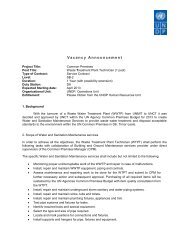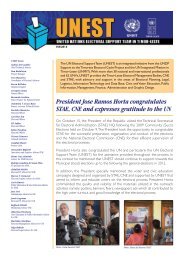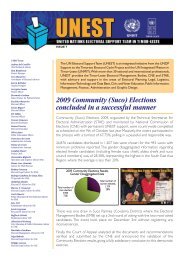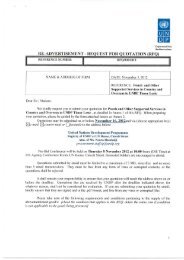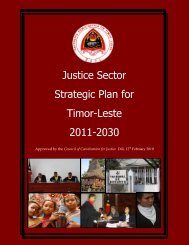Project Context and Description - UNDP Timor-Leste
Project Context and Description - UNDP Timor-Leste
Project Context and Description - UNDP Timor-Leste
You also want an ePaper? Increase the reach of your titles
YUMPU automatically turns print PDFs into web optimized ePapers that Google loves.
Consultancy for:<br />
TERMS OF REFERENCE<br />
Mid Term Evaluation Mission<br />
Independent Mid-term Evaluation Mission of the <strong>UNDP</strong>/OHCHR Capacity<br />
Building of PDHJ <strong>Project</strong><br />
<strong>Description</strong> of the assignment: NHRI Specialist for Mid Term Evaluation Mission<br />
Mission Duration:<br />
2 weeks (see below)<br />
Evaluation period: April 2013<br />
Mission Location:<br />
Dili, <strong>Timor</strong>-<strong>Leste</strong> with travel to districts<br />
I. Programme Background <strong>and</strong> <strong>Context</strong><br />
<strong>Project</strong> Title:<br />
Capacity Building of the Provedoria for Human Rights <strong>and</strong> Justice<br />
Duty Station:<br />
Dili, <strong>Timor</strong>-<strong>Leste</strong><br />
<strong>Project</strong> Duration: 2010 - 2014<br />
<strong>Project</strong> Budget: $3, 074,900<br />
Donors:<br />
New Zeal<strong>and</strong>, Sweden (SIDA), Irel<strong>and</strong>, UN Office of High Commission for<br />
Human Rights (OHCHR) <strong>and</strong> <strong>UNDP</strong><br />
National Institutions:<br />
Provedoria dos Diretos Humanos e Justiҫa (Ombudsman for Human Rights <strong>and</strong><br />
Justice)<br />
I: <strong>Project</strong> <strong>Context</strong> <strong>and</strong> <strong>Description</strong><br />
<strong>Context</strong>: Human Rights Situation in <strong>Timor</strong>-<strong>Leste</strong><br />
While the human rights record of <strong>Timor</strong>-<strong>Leste</strong> has been improving in the last years, challenges still<br />
remain to ensure the protection of all fundamental <strong>and</strong> human rights on the basis of equality, including<br />
economic <strong>and</strong> social rights.<br />
<strong>Timor</strong>-<strong>Leste</strong> has made positive strides in consolidating peace <strong>and</strong> stability. Free <strong>and</strong> fair presidential <strong>and</strong><br />
parliamentary elections took place in 2012; freedom of opinion <strong>and</strong> expression <strong>and</strong> the right to hold<br />
peaceful demonstrations are systematically respected; community participation in public affairs is<br />
improving <strong>and</strong> the independence of the judiciary is being strengthened to ensure the equality of people<br />
before the law.<br />
One of the main human rights complaints as reported in the Annual Report of the Provedoria relates to<br />
violations committed by security forces, police <strong>and</strong> the military, as part of their security related duties,<br />
but also in situations falling out of their m<strong>and</strong>ated roles. The main violations committed by security
forces are illegal arrest <strong>and</strong> detention, ill treatment during arrest <strong>and</strong> while detention 1 . Allegations of<br />
acts of torture committed by security forces as well as by prison authorities are less common. The level<br />
of accountability for human rights violations committed by security forces has increased, but is yet to<br />
reach the required level to ensure effective protection, <strong>and</strong> it thus requires a strong general effort by<br />
different actors to ensure consistency <strong>and</strong> compliance with national <strong>and</strong> international human rights<br />
st<strong>and</strong>ards <strong>and</strong> norms. Complaints related to ill-treatment <strong>and</strong> illegal detention by security forces remain<br />
still very high <strong>and</strong> represent more than 70% of the human rights complaints made to the PDHJ.<br />
The judicial system in <strong>Timor</strong>-<strong>Leste</strong> has improved its functioning <strong>and</strong> is currently able to deliver better<br />
<strong>and</strong> faster justice, due to improved capacity <strong>and</strong> more regular operation in the four judicial districts.<br />
Despite these improvements, challenges still remain to ensure access to justice to all particularly at local<br />
levels. State ability to comply with its duties to protect individuals from human rights violations,<br />
including through equal access to courts, is fundamental to ensure systematic respect to human rights in<br />
the <strong>Timor</strong>ese society. Violence against women <strong>and</strong> children also represent a problem which impacts<br />
heavily on the enjoyment of the rights of these groups 2 .<br />
<strong>Timor</strong>-<strong>Leste</strong> is seriously attempting to ensure it fulfils its obligations to ensure the progressive<br />
implementation of economic <strong>and</strong> social rights. As a consequence of its recent history, <strong>Timor</strong>-<strong>Leste</strong><br />
remains a low development country with a considerable part of the population living below the poverty<br />
line 3 . Access to services <strong>and</strong> facilities is still a challenge, which requires concerted <strong>and</strong> intense efforts<br />
from the Government, society <strong>and</strong> development partners 4 . The <strong>Timor</strong>-<strong>Leste</strong> Strategic Development Plan<br />
2011-2030 provides for a strong basis for improving the enjoyment of rights by all, but structural<br />
challenges remain to ensure that the State is able to implement the plan. High dropout rates in schools<br />
<strong>and</strong> poor quality of education 5 , malnutrition 6 , poor health facilities 7 <strong>and</strong> inadequate living conditions 8<br />
are the key economic <strong>and</strong> social challenges that remain to be addressed.<br />
<strong>Timor</strong>-<strong>Leste</strong> has a democratic constitution based on the rule of law. The Constitution provides for a<br />
series of fundamental rights that includes civil, political, economic, social <strong>and</strong> cultural rights. The<br />
Constitution also establishes a system for challenging laws which may violate the rights of individuals.<br />
Soon after the restoration of independence, <strong>Timor</strong>-<strong>Leste</strong> ratified all 7 core international human rights<br />
treaties without reservation. <strong>Timor</strong>-<strong>Leste</strong> has also ratified the Rome Statute on the International<br />
Criminal Court as well as a series of ILO conventions. As provided by the Constitution, international<br />
1 See PDHJ Annual Report to National Parliament, 2010 <strong>and</strong> 2011.<br />
2<br />
PDHJ Strategic Plan 2011-2020.<br />
3 See Programme of V Constitutional Government, p. 6-7.<br />
4<br />
See Statement of the Minister for Foreign Affairs to the United Nations Security Council, 12 November 2012, p.<br />
5.<br />
5 National Statistics Directorate, Demographic <strong>and</strong> Health Survey 2009-2010 p20. The UNESCO <strong>Timor</strong>-<strong>Leste</strong> Country<br />
Programming Document 2009-2013 (2009) states that 25% of children drop out, 16% repeat grades <strong>and</strong> only 46%<br />
of children reach Grade 6.<br />
6 National Statistics Directorate, Demographic <strong>and</strong> Health Survey 2009-2010 pps147-151. The Global Hunger Index<br />
lists 45.3% of <strong>Timor</strong>ese children under five as underweight International Food Policy Research Institute, Global<br />
Hunger Index, (2012).<br />
7 National Statistics Directorate, Demographic <strong>and</strong> Health Survey 2009-2010 pps113-115. The Demographic <strong>and</strong><br />
Health Survey shows that only 4% of women receive ante-natal care from a doctor. The millennium development<br />
goals indicators show that in 2009 only 29.9% of women were attended by skilled health personnel during birthing<br />
8 National Statistics Directorate, Demographic <strong>and</strong> Health Survey 2009-2010 pps22-27. 3 out of 10 households<br />
must walk for more than 30 minutes to return from their nearest water source. 43% of households have improved<br />
toilet facilities, 24% of rural households have access to electricity. 9 A/HRC/19/17/Add.1, 15 March 2012.<br />
2
treaties form part of national law <strong>and</strong> any law violating them is invalid. <strong>Timor</strong>-<strong>Leste</strong> has also begun the<br />
process of reporting on some of the treaties, but its limited capacity in this area means that the vast<br />
majority of treaties’ reporting are overdue. The first Universal Periodic Review (UPR) was completed in<br />
2011, where <strong>Timor</strong>-<strong>Leste</strong> accepted the vast majority of recommendations from the Human Rights<br />
Council 9 .<br />
The Provedoria for Human Rights <strong>and</strong> Justice<br />
The Provedoria for Human Rights <strong>and</strong> Justice (PDHJ) was established in 2004 through the National<br />
Parliament’s Law No. 7/2004. It is empowered to review complaints, conduct investigations <strong>and</strong> forward<br />
recommendations to prevent or redress illegality or injustice to the competent state organs. Within this<br />
framework, the PDHJ has a two-fold m<strong>and</strong>ate in the areas of human rights <strong>and</strong> good governance. The<br />
PDHJ structure is based on Decree Law 25/2011, Organic Structure of the Office for the Provedor for<br />
Human Rights <strong>and</strong> Justice, <strong>and</strong> is composed of 4 main directorates (Human Rights, Good Governance,<br />
Public Assistance <strong>and</strong> Finance <strong>and</strong> Administration) supervised by a Director General. The PDHJ also has a<br />
legal department <strong>and</strong> inspectorate office, which were first established only after its Organic Law was<br />
promulgated.<br />
Recent recruitment has allowed the Provedoria to establish four regional offices in Maliana, Baucau,<br />
Oecussi <strong>and</strong> Same. The strengthening of the regional office’s capacity to implement the m<strong>and</strong>ate of the<br />
Provedor is now a priority as outlined in the Strategic Plan.<br />
The PDHJ now has almost 100 out of a total planned 134 staff. Common challenges faced by other public<br />
institutions are also found in the PDHJ, which includes low participation of women in high level positions<br />
<strong>and</strong> limited capacity to evaluate results based performance of its staff. Despite those challenges, when<br />
compared with other public institutions, it is possible to see remarkable positive aspects in its<br />
institutional functions, including delegation of functions to Directors, leadership close relationship with<br />
technical staff, non reliance in international advisers to implement its main m<strong>and</strong>ated functions as well<br />
as sound financial <strong>and</strong> procurement practices, amongst others.<br />
The PDHJ is a member of the International Coordinating Committee of NHRIs <strong>and</strong> currently enjoys “A<br />
status” within the ICC framework, its status is to be reviewed in 2013. The PDHJ is also a full member of<br />
the Asia Pacific Forum of NHRI. In 2012, the PDHJ has been nominated as the Chair of the South East<br />
Asian NHRI Forum (SEANF), within which it cooperates with other Asian countries to undertake research<br />
<strong>and</strong> work on areas of interest to all members.<br />
In 2011, the PDHJ approved its 10 year Strategic Plan. The Strategic Plan, which brings a balanced<br />
strategy, with focus both on public institutions <strong>and</strong> the community, as well as a specific focus on the<br />
further development of the capacity of PDHJ. The Strategic Plan focuses in 4 main areas, out of which<br />
two areas relate to PDHJ support to strengthening the knowledge of public institutions <strong>and</strong> the<br />
improvement of its human rights <strong>and</strong> good governance records. Due to the reality faced in <strong>Timor</strong>ese<br />
society <strong>and</strong> the challenges to ensure enjoyment of the rights <strong>and</strong> access to public services on the basis<br />
of equality to all, the PDHJ has also developed a specific strategic focus related to vulnerable groups in<br />
the <strong>Timor</strong>ese society, including women <strong>and</strong> children.<br />
9 A/HRC/19/17/Add.1, 15 March 2012.<br />
3
<strong>UNDP</strong> in <strong>Timor</strong>-<strong>Leste</strong><br />
One of the United Nations Development Assistance Framework (UNDAF) outcomes is that by 2013,<br />
there will be stronger democratic institutions <strong>and</strong> mechanisms for social cohesion will be consolidated.<br />
The <strong>UNDP</strong> Country Program accordingly aims specifically to strengthen state institutions through<br />
interventions aimed at improving institutional capacity in planning, efficiency, accountability <strong>and</strong><br />
transparency (Country Program Outcome 1). A properly functioning Provedoria is key to fulfilling these<br />
aims, as the PDHJ plays an important role in ensuring the accountability <strong>and</strong> transparency of state<br />
institutions.<br />
The Country Programme Action Plan emphasizes <strong>UNDP</strong> commitment in continuing its support to<br />
strengthening the oversight functions <strong>and</strong> capacities of the PDHJ. The establishment <strong>and</strong> strengthening<br />
of NHRIs in line with the Paris Principles is also currently one of the key priority areas for OHCHR.<br />
<strong>Project</strong> Background<br />
The <strong>UNDP</strong>/OHCHR human rights capacity building project is now half way through its second cycle. The<br />
original project (2007-2009) was tailored to build the capacity of the PDHJ to carry out its human rights<br />
m<strong>and</strong>ate during the nascent stages of the institution’s development. At that time, most staff had little or<br />
no background in human rights <strong>and</strong> few of the relevant skills for the successful implementation of their<br />
work. The first phase of the project focused on providing a basic knowledge on human rights <strong>and</strong><br />
foundation skills for the monitoring, investigation <strong>and</strong> education activities at the core of the PDHJ’s<br />
human rights m<strong>and</strong>ate. The current <strong>Project</strong> cycle, running from 2010 -2014, works to build upon the<br />
existing human rights knowledge <strong>and</strong> skills with a focus on broadening human rights knowledge <strong>and</strong><br />
developing analysis <strong>and</strong> application of that knowledge. The investigation, monitoring <strong>and</strong> education<br />
skills that were developed during the first project cycle continue to be a focus throughout the life of the<br />
current project. This project also branches out into the development of other areas, including human<br />
resources, IT, finance <strong>and</strong> administration <strong>and</strong> PDHJ senior management , all of which have an impact<br />
upon the m<strong>and</strong>ate of the PDHJ, as defined by the PDHJ’s Organic Law.<br />
The project is also addressing several new areas of support to PDHJ institutional structures such as<br />
developing the new PDHJ legal advisory department, as well as institutional <strong>and</strong> knowledge<br />
management. This is in recognition of the impact that these institutional structures currently have on<br />
the ability of the PDHJ to fulfil its human rights m<strong>and</strong>ate. As outlined in the <strong>Project</strong> Document. the<br />
<strong>Project</strong> aims to support consistency, cost-effectiveness <strong>and</strong> coordination within the PDHJ by ensuring<br />
that capacity development interventions, where possible, include all four of the PDHJ’s directorates <strong>and</strong><br />
all four regional offices also.<br />
III. Rationale for Evaluation<br />
The <strong>UNDP</strong> PDHJ project, implemented from 2010 until the present, is midway through its project cycle.<br />
As provided in the <strong>Project</strong> Document an independent mid-term evaluation shall take place at the<br />
beginning of Year 3 to assess the progress made <strong>and</strong> produce recommendations on effective project<br />
implementation.<br />
The overall objective of the evaluation is to review the progress of the project towards achieving the key<br />
results envisaged in the <strong>Project</strong> Document; document the lessons learned; <strong>and</strong> to make<br />
recommendations for achievement of project results. The recommendations, along with the evaluation<br />
report itself, will guide the project management to take corrective actions to the extent possible to<br />
ensure project results are achieved <strong>and</strong> sustainable.<br />
4
IV. Evaluation Objective <strong>and</strong> Scope<br />
The mission will assess the relevance, sustainability <strong>and</strong> effectiveness of the <strong>Project</strong>’s strategy, outputs<br />
<strong>and</strong> management arrangements based on the progress of the project with regards the fulfilment of the<br />
three project outputs, namely:<br />
1(a)<br />
1(b)<br />
2(a)<br />
3(a)<br />
PDHJ staffs are knowledgeable about human rights concepts <strong>and</strong> underst<strong>and</strong> how these<br />
concepts are applied in their work<br />
PDHJ has a workforce skilled enough to implement the Institutions’ human rights<br />
m<strong>and</strong>ate, including the ability to conduct legal analysis<br />
PDHJ has effective <strong>and</strong> efficient institutional structures <strong>and</strong> management systems<br />
PDHJ has effective information <strong>and</strong> knowledge management systems<br />
The evaluation will assess the <strong>Project</strong>’s progress in achieving the results in these areas as envisaged in<br />
the <strong>Project</strong> Document, including identification of areas which there are visible improvements as a result<br />
of <strong>Project</strong>’s support <strong>and</strong>/or those that require particular attention. The evaluation should also review<br />
the effectiveness of the <strong>Project</strong>’s capacity development strategy <strong>and</strong> also make recommendations for<br />
the remainder of the <strong>Project</strong> cycle to ensure continued relevance <strong>and</strong> sustainability, including<br />
identification of areas which the PDHJ might need further support from the project. In doing so, it<br />
should guide the PDHJ project team to better support the PDHJ through sustainable capacity<br />
development, <strong>and</strong> to support an awareness <strong>and</strong> protection of human rights for the people of <strong>Timor</strong>-<br />
<strong>Leste</strong>.<br />
Specifically, the evaluation will assess the following aspects of the <strong>Project</strong>s activities:<br />
1. Relevance<br />
a) Progress of the <strong>Project</strong> in achieving its 3 outcomes<br />
b) Relevance of the 3 outcomes in relation to the new Organic Law of the PDHJ (Decree Law<br />
25/2011) <strong>and</strong> the PDHJ strategic plan;<br />
c) The extent to which the activities of the <strong>Project</strong> are relevant to the needs of the PDHJ, as<br />
well as to the main human rights issues in <strong>Timor</strong>-<strong>Leste</strong><br />
d) The extent to which gender <strong>and</strong> other vulnerable groups have been considered by the<br />
<strong>Project</strong> activities;<br />
e) Flexibility of the project to adequately responded to changing needs of the PDHJ based on<br />
emerging institutional, legal <strong>and</strong> other issues through its planning <strong>and</strong> regular review<br />
processes;<br />
f) Whether the current monitoring <strong>and</strong> evaluation tools used by the <strong>Project</strong> are adequate to<br />
measure the impact of the <strong>Project</strong>’s activities on PDHJ capacity;<br />
g) Assess effectiveness of project strategy <strong>and</strong> tactics in the planning <strong>and</strong> implementation of<br />
<strong>Project</strong> activities in ensuring achievement of project results.<br />
2. Sustainability<br />
a) Whether the project is using appropriate capacity development methodologies to ensure<br />
effective transfer of legal, technical (investigative, monitoring, research, communication <strong>and</strong><br />
education) <strong>and</strong> management knowledge <strong>and</strong> skills to PDHJ staff;<br />
b) The extent to which tools (manuals <strong>and</strong> other resources) made in collaboration with the PDHJ<br />
support the sustainability of knowledge <strong>and</strong> skills for the future successful implementation of<br />
activities by the PDHJ;<br />
5
c) Whether the <strong>Project</strong> has supported PDHJ in ensuring a gradual decrease on the involvement of<br />
international staff/experts to support its work;<br />
d) Whether the level <strong>and</strong> nature of the PDHJ leadership <strong>and</strong> senior management engagement in<br />
the implementation of the <strong>Project</strong> contributes to sustainability <strong>and</strong> ownership;<br />
e) The extent of the human resource plans of the PDHJ <strong>and</strong> their link with the exit strategy of the<br />
<strong>Project</strong><br />
f) Whether sufficient attention has been given to support the strengthening of PDHJ partnership<br />
with other NHRIs <strong>and</strong> other UN agencies.<br />
3. Effectiveness<br />
a) The degree to which the <strong>Project</strong> assistance has resulted in an increase in institutional <strong>and</strong><br />
individual capacity of the PDHJ;<br />
b) Whether the current project management structure <strong>and</strong> staffing is effective <strong>and</strong> efficient to<br />
produce the required results;<br />
c) Whether the project results represent value for money. Identify elements, besides operational<br />
costs, that have generated added value for the PDHJ through project interventions.<br />
d) Assess the extent to which a results based management approach has been adopted, <strong>and</strong> its<br />
effectiveness.<br />
The time period to be covered by the evaluation is from January 2010 to end of February 2013.<br />
V. Evaluation Deliverables<br />
The Evaluation Team will produce the following outputs:<br />
a) Inception Report<br />
b) Executive Summary <strong>and</strong> Preliminary Recommendations<br />
c) Evaluation Report<br />
Inception Report<br />
The Evaluation Team will submit an inception report which should reflect the evaluators’ underst<strong>and</strong>ing<br />
of the assignment; proposed approach <strong>and</strong> methodology; <strong>and</strong> schedule of tasks, activities <strong>and</strong><br />
deliverables along with assigned responsibilities for the mission members. The inception report should<br />
include:<br />
a) A list of all information the evaluators feel they will need as part of the evaluation<br />
b) Methods that will be used for data/information collection to address each of the evaluation<br />
questions (interviews, questionnaires, surveys, workshops, etc)<br />
c) Whether qualitative or quantitative methods will be used for each evaluation area<br />
d) Details of what groups information will be collected from <strong>and</strong> how the inclusion of these groups<br />
ensure that the opinions of all stakeholders are included, including beneficiaries’ stakeholders,<br />
like women, <strong>and</strong> other vulnerable groups)<br />
e) Method for cross checking all gathered information<br />
f) Procedures to be used for data analysis – how will qualitative data from interviews be analysed<br />
g) Methods to ensure that findings will be fed back <strong>and</strong> discussed with appropriate stakeholders<br />
during the evaluation process<br />
h) Identification of risks or limitations in the review or evaluation, <strong>and</strong> the approach to mitigate<br />
them<br />
6
The inception report will be submitted to <strong>UNDP</strong>, UNHCR <strong>and</strong> PDHJ for comments <strong>and</strong> feedback shall be<br />
given within 2 days of the submission.<br />
Summary of Preliminary Findings <strong>and</strong> Recommendations<br />
The Evaluation Team will present a summary of evaluation preliminary findings <strong>and</strong> recommendations at<br />
a debriefing meeting before the extended <strong>Project</strong> Steering Committee 10 to be organized by the PMU of<br />
the <strong>Project</strong>. The briefing aims at sharing the preliminary findings <strong>and</strong> recommendations <strong>and</strong> receiving<br />
feedback from the <strong>Project</strong> Steering Committee.<br />
Evaluation Report<br />
The Evaluation Team will submit a draft evaluation report to <strong>UNDP</strong>, highlighting achievements,<br />
constraints, lessons learned, conclusions recommendations <strong>and</strong>, where required, corrective measures<br />
on the <strong>Project</strong>’s role in the PDHJ. The evaluation report shall contain the following structure:<br />
a) Title Page<br />
b) List of acronyms <strong>and</strong> abbreviations<br />
c) Table of contents, including list of annexes<br />
d) Executive Summary<br />
e) Introduction: background <strong>and</strong> context of the project<br />
f) The rationale <strong>and</strong> purpose of the <strong>Project</strong><br />
g) <strong>Description</strong> of the project – its logic theory, results framework <strong>and</strong> external factors likely to<br />
affect success<br />
h) Purpose of the evaluation<br />
i) Timing of the review or evaluation<br />
j) Key questions <strong>and</strong> scope of the evaluation with information on limitations <strong>and</strong> delimitations<br />
k) Approach <strong>and</strong> methodology<br />
l) Governance <strong>and</strong> management aspects<br />
m) The role <strong>and</strong> involvement of other stakeholders<br />
n) Findings<br />
o) Summary <strong>and</strong> explanation of findings <strong>and</strong> interpretations<br />
p) Conclusions<br />
q) Recommendations<br />
r) Lessons, generalisations, alternatives (including how the evaluation findings will feed into<br />
on-going learning, decision making <strong>and</strong> improvement)<br />
s) Composition of the evaluation team <strong>and</strong> their roles <strong>and</strong> responsibilities<br />
t) Annexes<br />
The Evaluation team should refer to <strong>UNDP</strong> guidelines on the structure of evaluation reports to ensure<br />
correct formatting <strong>and</strong> structure. The final report shall not exceed a total of 30 pages.<br />
10 Composition of the ordinary PSC is: Provedor, Deputy Provedor for Human Rights, Human Rights Division<br />
Director, NGO Representatives, OHCHR Representative (Director of HRTJS of UNMIT) <strong>and</strong> <strong>UNDP</strong> Representative.<br />
The extended PSC is conducted at the discretion of the Provedor <strong>and</strong> includes relevant donors, currently Irel<strong>and</strong>,<br />
Sweden <strong>and</strong> New Zeal<strong>and</strong>.<br />
7
V. Activities<br />
The main activities to be carried out by the evaluation team are: review of existing documentation,<br />
preparation of inception report, consultations with beneficiaries <strong>and</strong> stakeholders, preliminary<br />
recommendations <strong>and</strong> briefing <strong>and</strong> draft <strong>and</strong> final evaluation report.<br />
The Evaluation Team should ensure that the assignment is carried out with due diligence, efficiency <strong>and</strong><br />
economy in accordance with the time specified. The evaluation team should observe sound<br />
management <strong>and</strong> technical practices <strong>and</strong> comply with professional consulting st<strong>and</strong>ards.<br />
Review existing documentation<br />
The Evaluation Team will conduct a desk review on national human rights <strong>and</strong> related issues, including<br />
the <strong>Project</strong> Document, PDHJ Strategic Plan, Quarterly <strong>and</strong> Annual <strong>Project</strong> Reports, the PDHJ<br />
communication strategic plan, the PDHJ Statute <strong>and</strong> Organic Law, complaint operations manual, PDHJ<br />
reports <strong>and</strong> other relevant documents, including the <strong>Project</strong> mentoring reports, training materials <strong>and</strong><br />
PDHJ/<strong>Project</strong> human rights <strong>and</strong> good governance tools. This documentation will be made available to<br />
Mission members prior to their deployment to <strong>Timor</strong>-<strong>Leste</strong>. <strong>UNDP</strong> documents such as the St<strong>and</strong>ards for<br />
Evaluation for the UN system <strong>and</strong> Monitoring <strong>and</strong> Evaluation Frameworks shall also be consulted.<br />
Preparation of Inception Report<br />
The Team Leader will present an Inception Report elaborating the Mission’s evaluation methodology to<br />
the stakeholders at the beginning of the evaluation mission. The inception report shall include the<br />
relevant sections highlighted in section V above, Inception Report.<br />
Meetings with beneficiaries <strong>and</strong> stakeholders<br />
The following is a list of the main beneficiaries <strong>and</strong> stakeholders which are believed to have the<br />
information needed to conduct this evaluation:<br />
• The <strong>UNDP</strong>/OHCHCR <strong>Project</strong> Management Team will brief the Mission upon arrival <strong>and</strong><br />
provide all necessary detail <strong>and</strong> clarifications on the documents made available for the desk<br />
review.<br />
• The Mission will hold meetings with <strong>UNDP</strong> Country Director <strong>and</strong> any OHCHR staff based in<br />
<strong>Timor</strong>-<strong>Leste</strong> .<br />
• The Mission will meet <strong>and</strong> extensively consult with the Provedor, his Two Deputies. Director<br />
General <strong>and</strong> PDHJ staff, including staff from the Human Rights <strong>and</strong> Good Governance<br />
Directorate, Directorate of Public Assistance. Directorate of Administration <strong>and</strong> Finance.<br />
Office for Legal Adviser <strong>and</strong> Regional Office staff .<br />
• The mission will meet with selected representatives from Governmental institutions,<br />
including the Director of the Citizenship <strong>and</strong> Human Rights Directorate of the Ministry of<br />
Justice, the Chief of the Police Detention Centre in Dili, Operational PNTL Comm<strong>and</strong>er,<br />
Director of the Becora Prison, CNE Commissioner, officer of the Ministry of Administration<br />
<strong>and</strong> Territory Ordenance, the chief of the training unit in the PNTL Police Academy, the<br />
Captain in charge of Capacity Division of the Army Academy.<br />
• The Mission will meet with selected community leaders, teachers, military officers, police<br />
<strong>and</strong> prison guards who have participated in trainings delivered by the PDHJ;<br />
• The Mission will meet with bilateral donor representatives providing assistance to the PDHJ,<br />
including representatives from New Zeal<strong>and</strong>, Sweden <strong>and</strong> Irel<strong>and</strong>.<br />
8
• The Mission shall also meet with AUSAID Justice Facilities <strong>Project</strong> <strong>and</strong> USAID, who are<br />
providing some support to the PDHJ.<br />
The mission will meet with relevant civil society organisations, such as the PDHJ NGO<br />
network members, Asosiasaun HAK, Fokuppers, Forum Tau Matan, etc.<br />
Preliminary Findings <strong>and</strong> Recommendations <strong>and</strong> Briefing<br />
The evaluation mission shall present shortly before the evaluation period ends preliminary findings.<br />
Stakeholder feedback will be incorporated into the draft report.<br />
Submission of draft <strong>and</strong> final mid-term evaluation report<br />
The evaluation report shall be submitted by the Team Leader no later than 10 days after the end of the<br />
mission. The final report incorporating PDHJ, <strong>UNDP</strong> <strong>and</strong> OHCHR feedback shall be submitted by the<br />
Team Leader one week after receiving the written comments <strong>and</strong> feedback.<br />
Qualifications for the NHRI Specialist<br />
• University Degree or equivalent in public administration, law or another relevant area.<br />
• At least 7 years of experience working as a member or a staff of a NHRI, preferably a NHRI in a<br />
developing country, or working in supporting the capacity development of NHRIs<br />
• Familiarity with international context <strong>and</strong> post-conflict <strong>and</strong> developing societies.<br />
• Experience in developing management tools <strong>and</strong> internal procedures for NHRIs<br />
• Experience in designing <strong>and</strong> delivering trainings, or other capacity development activities tp<br />
NHRI staff <strong>and</strong>/or professional groups, an asset<br />
• Experience <strong>and</strong> knowledge of the socio-political context of post-conflict countries, in particular<br />
in relation to the human rights situation.<br />
• Proven skills in NHRIs related m<strong>and</strong>ate areas (investigation, monitoring or promotion <strong>and</strong><br />
education)<br />
• Ability to organize <strong>and</strong> synthesize information in a systematic manner<br />
• Initiative, ability to work independently sound judgment <strong>and</strong> good interpersonal skills<br />
Schedule<br />
Preliminary phase:<br />
15 days before the arrival of the mission the <strong>Project</strong> will send all needed documentation to the<br />
Evaluation mission team.<br />
Day 1-3<br />
Preliminary consultations <strong>and</strong> presentation to <strong>UNDP</strong> the evaluation mission inception report.<br />
Day 3- 10<br />
Consultation with relevant actors <strong>and</strong> stakeholders. At least one visit to a PDHJ Regional Office.<br />
Day 11-12<br />
Evaluation mission meets to finalise report drafting <strong>and</strong> proposal of initial recommendations.<br />
9
Day 13- 14<br />
Briefing presentation of the preliminary findings <strong>and</strong> recommendations<br />
Day 15<br />
Evaluation Mission team leaves <strong>Timor</strong>-<strong>Leste</strong><br />
Day 25<br />
Draft Evaluation Report submitted to <strong>UNDP</strong>, OHCHR <strong>and</strong> PDHJ<br />
Day 35<br />
Comments sent by <strong>UNDP</strong>, OHCHR <strong>and</strong> PDHJ 11<br />
Day 40<br />
Final Evaluation Report<br />
VI. Reporting <strong>and</strong> Mission Support<br />
The mission will perform as an external independent mid-term evaluation mission, meaning that its<br />
members will not have been involved in the design, implementation or regular monitoring of the<br />
<strong>Project</strong>.<br />
The mission will present its preliminary findings <strong>and</strong> recommendations to the <strong>Project</strong> Steering<br />
Committee at the end of the mission. Draft mission report will be submitted to the <strong>UNDP</strong> Country<br />
Director who will share the report with <strong>Project</strong> Steering Committee members for comments <strong>and</strong><br />
feedback, which will be incorporated by the mission in the final evaluation report.<br />
The <strong>Project</strong> Management Unit (PMU), will provide the required logistic <strong>and</strong> administrative support, <strong>and</strong><br />
facilitate mission meetings, as requested. Transport for official purposes will be provided by <strong>UNDP</strong>,<br />
which will also make a translator/interpreter available to the mission. The PMU will also provide the<br />
required background documents <strong>and</strong> reports requested by the mission.<br />
In order to guarantee an acceptable st<strong>and</strong>ard <strong>and</strong> quality of work in the evaluation report, evaluation<br />
team members should refer to the <strong>UNDP</strong> H<strong>and</strong>book on Planning, Monitoring <strong>and</strong> Evaluating for<br />
Development Results <strong>and</strong> DAC Evaluation Quality St<strong>and</strong>ards.<br />
11 Parts of the draft report need to be translated for meaningful comments from PDHJ.<br />
10



![Progress Report for [Project Name] - UNCDF](https://img.yumpu.com/41239693/1/184x260/progress-report-for-project-name-uncdf.jpg?quality=85)

